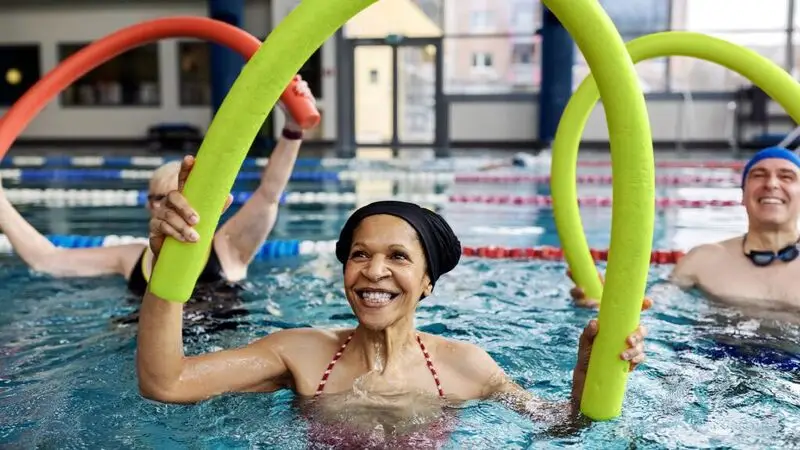
- Physical activity might not play as prominent a role in reducing the risk or preventing cognitive decline as previously thought, according to a new study.
- Even though the researchers reported that physical activity had a weak association with lowering the risk of cognitive decline, they said even a slight reduction can be helpful.
- The researchers note that the studies included in the meta-analysis have shortcomings but do not believe the low quality of the studies significantly altered the results.
Physical activity is associated with a lower the risk of cognitive decline.
However, according to a
The study examined whether physical activity is associated with cognitive decline and whether there is a dose-response association between physical activity and cognition.
The scientists concluded that physical activity might postpone cognitive decline, but only to a small extent.
The weaker association remained, even when looking at the preceding levels of cognition or age of the participant.
Researchers looked at 104 studies with a total of 341,741 participants.
The study’s analysis of binary outcomes included 45 studies with a total of 102,452 participants.
When looking specifically at follow-up global cognition, they reviewed data from 14 studies that included 41,045 participants. When evaluating changes in global cognition, they included 25 studies with 67,643 individuals.
Evaluating
The researchers found that:
- Overall, there was only a minimal association between physical activity and reduced risk of cognitive impairment.
- There was a dose-response association between physical activity and cognition in the studies that evaluated binary outcomes. These studies were those that just looked at whether a person either did or did not experience cognitive decline.
- No dose-dependent associations were seen for studies looking at follow-up global cognition or for changes in global cognition.
- In the studies that looked into specific cognitive domains, there was a weak associations between episodic memory and verbal fluency in studies that looked at follow-up global cognition and changes in global cognition.
- The results for executive function were mixed.
The researchers noted that the studies they reviewed were often not highly evaluated.
For example, among the 25 studies that assessed a change in global cognition, there were five moderate-quality studies and 20 low-quality studies.
“I agree with the study’s methodologies and findings. However, there were no findings about cognition in mid-life, only late life,” said Ryan Glatt, CPT, a senior brain Health coach and director of the FitBrain Program at Pacific Neuroscience Institute in California who was not involved in the research.
“However, the cognitive outcome measures seemed to be limited, and practice effects were not considered when evaluating the cognitive measures,” he told Medical News Today. “Many of the studies analyzed were not high quality, which may affect the findings.”
Although the researchers found that physical activity had a weak association with lowering the risk of cognitive decline, they believed that even a weak association is important.
“This systematic review and meta-analysis seem to reinforce the belief that exercise plays a role in slowing cognitive decline. One interesting question this study seems to answer is ‘how much,’ and it is interesting to read the conclusion of ‘only to a very small extent,'” Glatt said. “This [conclusion] challenges prior biases about how much physical activity can make a difference, but there are some caveats. As the study states, ‘even a weak association is important from a population health perspective.'”
“This study provides new information regarding how strong the association of baseline physical activity is with late-life cognition, and while physical activity will be strongly recommended and encouraged for individuals, the narrative of the magnitude of its importance may be modified,” Glatt added.
The researchers noted that their results indicated a dose-response association between physical activity and cognition in studies that looked at binary outcomes.
Follow-up length, follow-up rate, and physical activity measurement type and quality all played a role in determining the association.
They further noted that they also found that study quality did not significantly moderate any of the associations. For a study to be considered high-quality, it must include more than a 10-year follow-up.
The researchers said they do not believe any other meta-analysis examined continuous outcomes or specific cognitive domains. In addition, they had access to more than 300,000 participants’ medical records.
The most obvious limitation is the sub-standard study quality. There was limited data examining mid-life physical activity and cognition. The scientists noted that excluding studies without valid measures of cognition at baseline might have limited their ability to detect adjustment for baseline cognition.
The researchers indicated they did not assess whether studies accounted for practice effects when measuring cognition.
“When engaging in healthy lifestyle factors for brain health, lifestyle behaviors such as physical activity and cognitive stimulation can help to increase brain blood flow, improve heart health, increase brain activity, and increase brain volumes,” Glatt said
“Even for individuals with cognitive decline and dementia, adhering to and improving upon multiple lifestyle factors may be able to slow cognitive decline or improve behavioral outcomes such as mood or certain aspects of cognition,” he added. “However, this depends upon multiple individual, biological, and environmental factors, including the specific lifestyle changes the person follows.”





